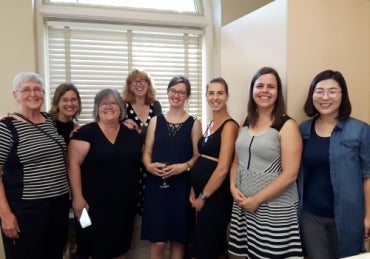Identity | Structure | Values | Goals and strategies
Identity
Toronto Mennonite Theological Centre (TMTC) is a graduate teaching and research centre of Conrad Grebel University College (CGUC), affiliated with the Toronto School of Theology (TST). It promotes Anabaptist-Mennonite scholarship in the academy within an ecumenical context, theological leadership in the church, and inter-faith and inter-religious conversation. TMTC was established in 1990 at the Toronto School of Theology to promote inter-Mennonite and ecumenical teaching and research at the graduate-doctoral level. It is intended to nurture the development of committed and well-trained theological leadership for the church. Since 2000 TMTC is part of CGUC's Graduate Theological Studies program. CGUC is a Christian educational institution on the campus of University of Waterloo, informed by the vision and values of the Mennonite tradition and dedicated to serving students, the academic community, and society.
Structure
In keeping with the above, CGUC holds primary financial and administrative responsibility for the Centre, but does so as "steward" on behalf of Mennonite schools and agencies committed to graduate theological education, within the context of Mennonite Church Canada and Mennonite Church U.S.A.
TMTC is supported by an Advisory Council made up of representatives from Mennonite educational institutions, conference bodies and church agencies in both Canada and U.S.A. This Advisory Board has a consultative function, and plays a significant role in financing TMTC together with CGUC, and setting the overall vision and direction of the program.
TST, located at the University of Toronto, is an ecumenical federation of seven theological colleges, plus four affiliated institutions, representing Roman Catholic, Anglican, Presbyterian, Anabaptist-Mennonite, Baptist, Lutheran and Reformed traditions. It is the largest graduate theological faculty in North America. CGUC's and the TMTC's affiliation with TST entitles Mennonite graduate faculty to be full and/or adjunct professors of TST, and approved CGUC's graduate courses to be part of TST offerings. CGUC's president serves on the TST Board.
Values
 TMTC seeks to foster inter-disciplinary reflection on the Anabaptist-Mennonite heritage, as well as other traditions by graduate students and scholars in theology and other fields of knowledge. It encourages graduate students to grow toward wise theological discernment, spiritual depth and maturity, excellent scholarship, mutual and respectful dialogue, and ecumenical and global awareness. These theologians contribute to the health of the Mennonite church with its institutions and also the larger church and society through teaching, research and writing, and a variety of church-related ministries. TMTC is also devoted to creating an awareness of the Anabaptist-Mennonite tradition among scholars, teachers and students from other Christian and religious traditions.
TMTC seeks to foster inter-disciplinary reflection on the Anabaptist-Mennonite heritage, as well as other traditions by graduate students and scholars in theology and other fields of knowledge. It encourages graduate students to grow toward wise theological discernment, spiritual depth and maturity, excellent scholarship, mutual and respectful dialogue, and ecumenical and global awareness. These theologians contribute to the health of the Mennonite church with its institutions and also the larger church and society through teaching, research and writing, and a variety of church-related ministries. TMTC is also devoted to creating an awareness of the Anabaptist-Mennonite tradition among scholars, teachers and students from other Christian and religious traditions.
Goals and strategies
- Provide a voice for such important concerns as Believers Church ecclesiology, peace, Radical Reformation history and theology at TST through faculty resources, special lecturers, staff, course offerings, departmental participation, panels, seminars and conferences.
- Provide a "home base" for Mennonite graduate students at TST, and a context in which students can share their ideas with each other and with Mennonite professors.
- Assist graduate students (primarily on the doctoral level) in theology and religion, especially at TST, but where possible elsewhere as well, relate the Anabaptist-Mennonite tradition to their academic research. This could take the form of developing and making available address lists of graduate students, and sponsoring graduate student conferences.
- Provide assistance in terms of advice and counsel, such as academic advising via the professors associated with TMTC, particularly at the doctoral level (thesis supervision, accepting TST departmental responsibilities, sitting on a variety of committees, etc.).
- Create a visible Mennonite presence on the TST campus engaged in intentional ecumenical (both inter-faith and inter-Christian) dialogue. Arrange dialogue between representatives of various Christian and religious traditions on relevant topics.
- Provide a setting for sabbatical leaves for professors from other Mennonite institutions, both in terms of research and teaching opportunities.
- Provide the time and staffing to nurture an international network of Anabaptist and Mennonite scholars and friends (including doctoral students) via newsletters, Internet connections, conferences, lists of scholars and forums such as those of the American Academy of Religion (AAR) and Society of Biblical Literature (SBL).
- Help Mennonite institutions find faculty in theology and religion able to integrate their academic discipline within the Anabaptist-Mennonite tradition, and to help younger Mennonite theologians find employment that contributes to the life of the church.




